HSW1110 Assessment 3: A Reflective Analysis of Mental Health Views
VerifiedAdded on 2023/06/03
|9
|2312
|378
Essay
AI Summary
This essay reflects on the student's evolving understanding of mental health, shaped by personal experiences, social media, and academic learning. It explores the impact of personal beliefs and attitudes on perceptions of mental illness, highlighting the influence of social stigma and media portrayals. The reflection covers the importance of therapeutic communication, cultural competence in healthcare, and the interconnectedness of mental and physical well-being. The essay also addresses barriers to effective mental health care and emphasizes the need for empathy and compassion in professional practice. The student details how course topics have enhanced their knowledge and approach to client care, ultimately advocating for a holistic consideration of both mental and physical health in treatment strategies. Desklib offers similar solved assignments for students.
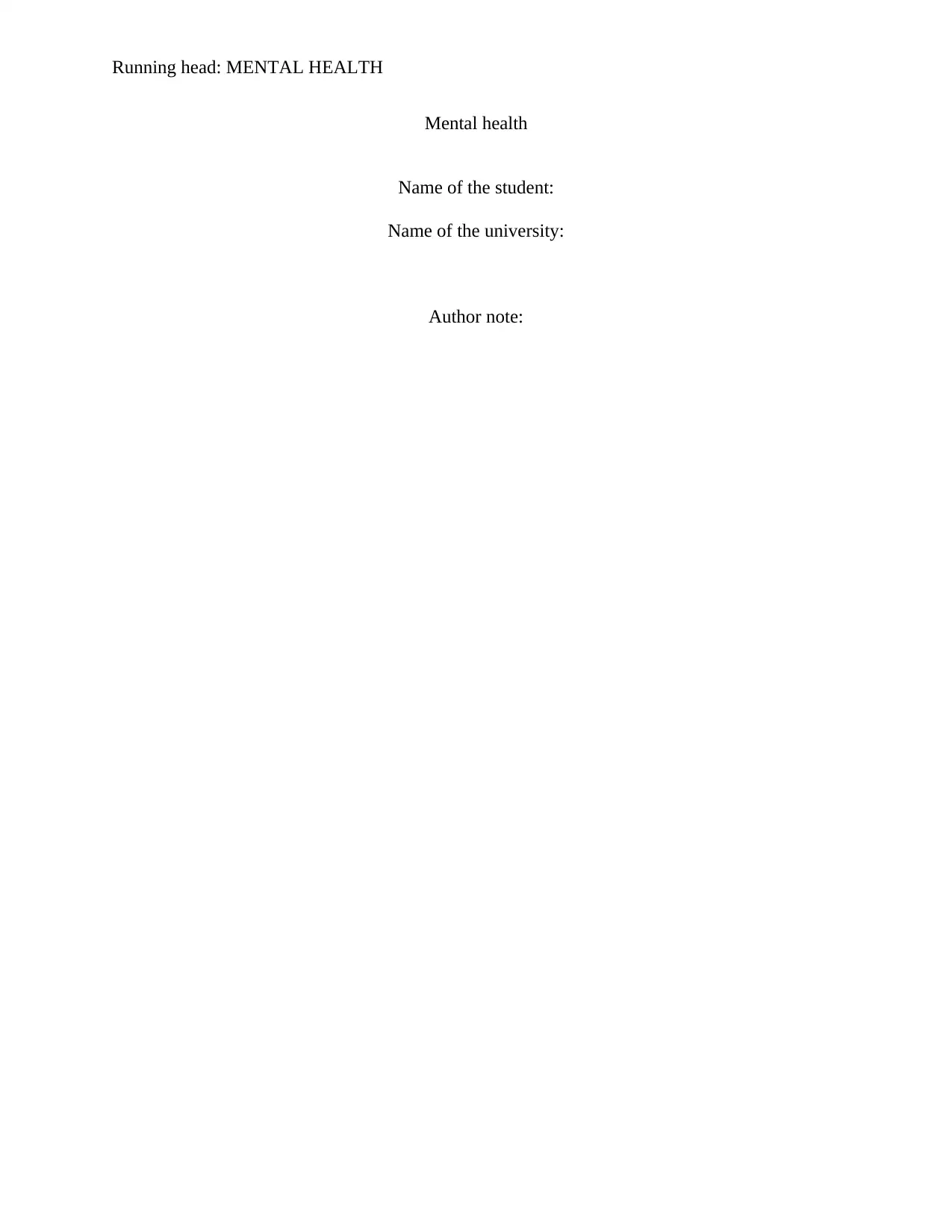
Running head: MENTAL HEALTH
Mental health
Name of the student:
Name of the university:
Author note:
Mental health
Name of the student:
Name of the university:
Author note:
Paraphrase This Document
Need a fresh take? Get an instant paraphrase of this document with our AI Paraphraser
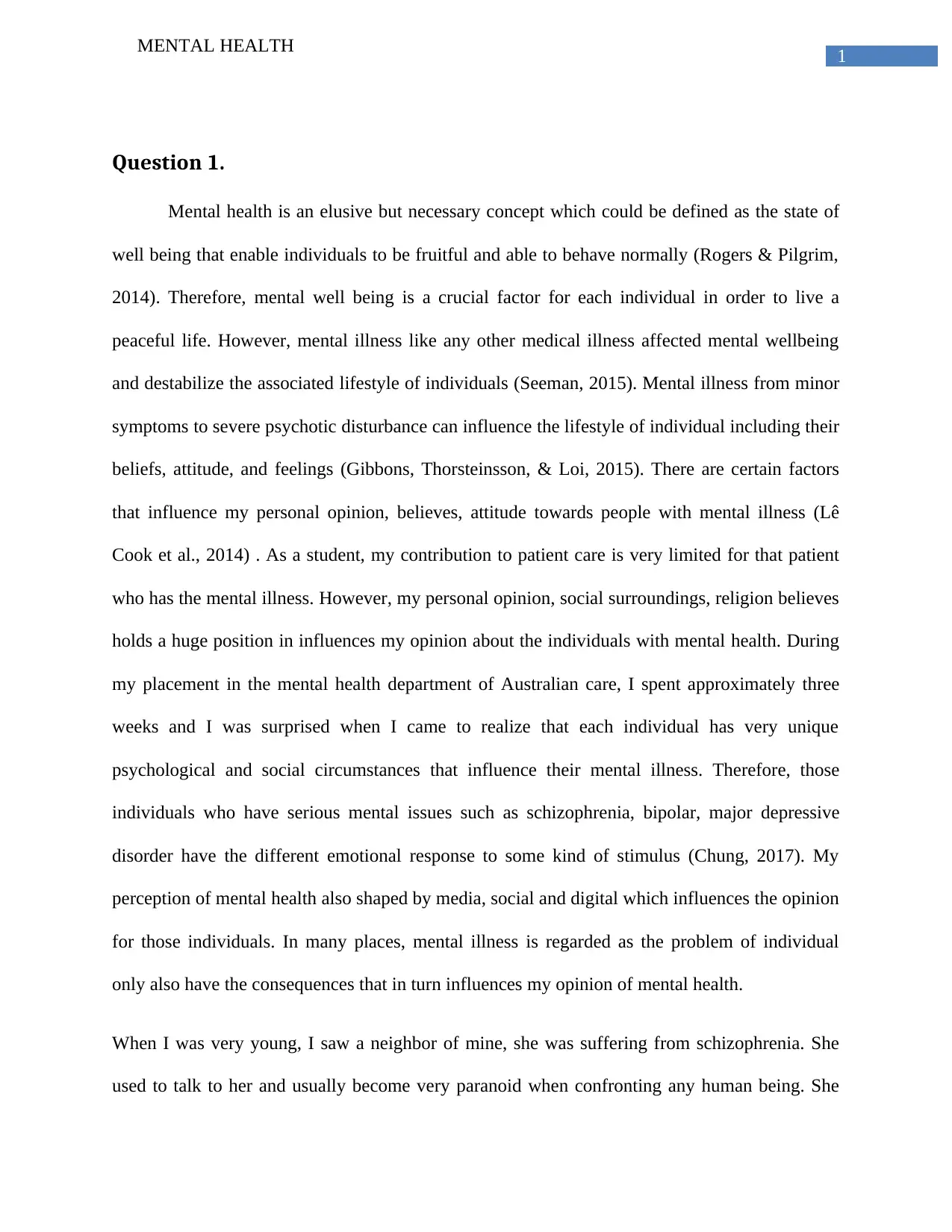
1
MENTAL HEALTH
Question 1.
Mental health is an elusive but necessary concept which could be defined as the state of
well being that enable individuals to be fruitful and able to behave normally (Rogers & Pilgrim,
2014). Therefore, mental well being is a crucial factor for each individual in order to live a
peaceful life. However, mental illness like any other medical illness affected mental wellbeing
and destabilize the associated lifestyle of individuals (Seeman, 2015). Mental illness from minor
symptoms to severe psychotic disturbance can influence the lifestyle of individual including their
beliefs, attitude, and feelings (Gibbons, Thorsteinsson, & Loi, 2015). There are certain factors
that influence my personal opinion, believes, attitude towards people with mental illness (Lê
Cook et al., 2014) . As a student, my contribution to patient care is very limited for that patient
who has the mental illness. However, my personal opinion, social surroundings, religion believes
holds a huge position in influences my opinion about the individuals with mental health. During
my placement in the mental health department of Australian care, I spent approximately three
weeks and I was surprised when I came to realize that each individual has very unique
psychological and social circumstances that influence their mental illness. Therefore, those
individuals who have serious mental issues such as schizophrenia, bipolar, major depressive
disorder have the different emotional response to some kind of stimulus (Chung, 2017). My
perception of mental health also shaped by media, social and digital which influences the opinion
for those individuals. In many places, mental illness is regarded as the problem of individual
only also have the consequences that in turn influences my opinion of mental health.
When I was very young, I saw a neighbor of mine, she was suffering from schizophrenia. She
used to talk to her and usually become very paranoid when confronting any human being. She
MENTAL HEALTH
Question 1.
Mental health is an elusive but necessary concept which could be defined as the state of
well being that enable individuals to be fruitful and able to behave normally (Rogers & Pilgrim,
2014). Therefore, mental well being is a crucial factor for each individual in order to live a
peaceful life. However, mental illness like any other medical illness affected mental wellbeing
and destabilize the associated lifestyle of individuals (Seeman, 2015). Mental illness from minor
symptoms to severe psychotic disturbance can influence the lifestyle of individual including their
beliefs, attitude, and feelings (Gibbons, Thorsteinsson, & Loi, 2015). There are certain factors
that influence my personal opinion, believes, attitude towards people with mental illness (Lê
Cook et al., 2014) . As a student, my contribution to patient care is very limited for that patient
who has the mental illness. However, my personal opinion, social surroundings, religion believes
holds a huge position in influences my opinion about the individuals with mental health. During
my placement in the mental health department of Australian care, I spent approximately three
weeks and I was surprised when I came to realize that each individual has very unique
psychological and social circumstances that influence their mental illness. Therefore, those
individuals who have serious mental issues such as schizophrenia, bipolar, major depressive
disorder have the different emotional response to some kind of stimulus (Chung, 2017). My
perception of mental health also shaped by media, social and digital which influences the opinion
for those individuals. In many places, mental illness is regarded as the problem of individual
only also have the consequences that in turn influences my opinion of mental health.
When I was very young, I saw a neighbor of mine, she was suffering from schizophrenia. She
used to talk to her and usually become very paranoid when confronting any human being. She
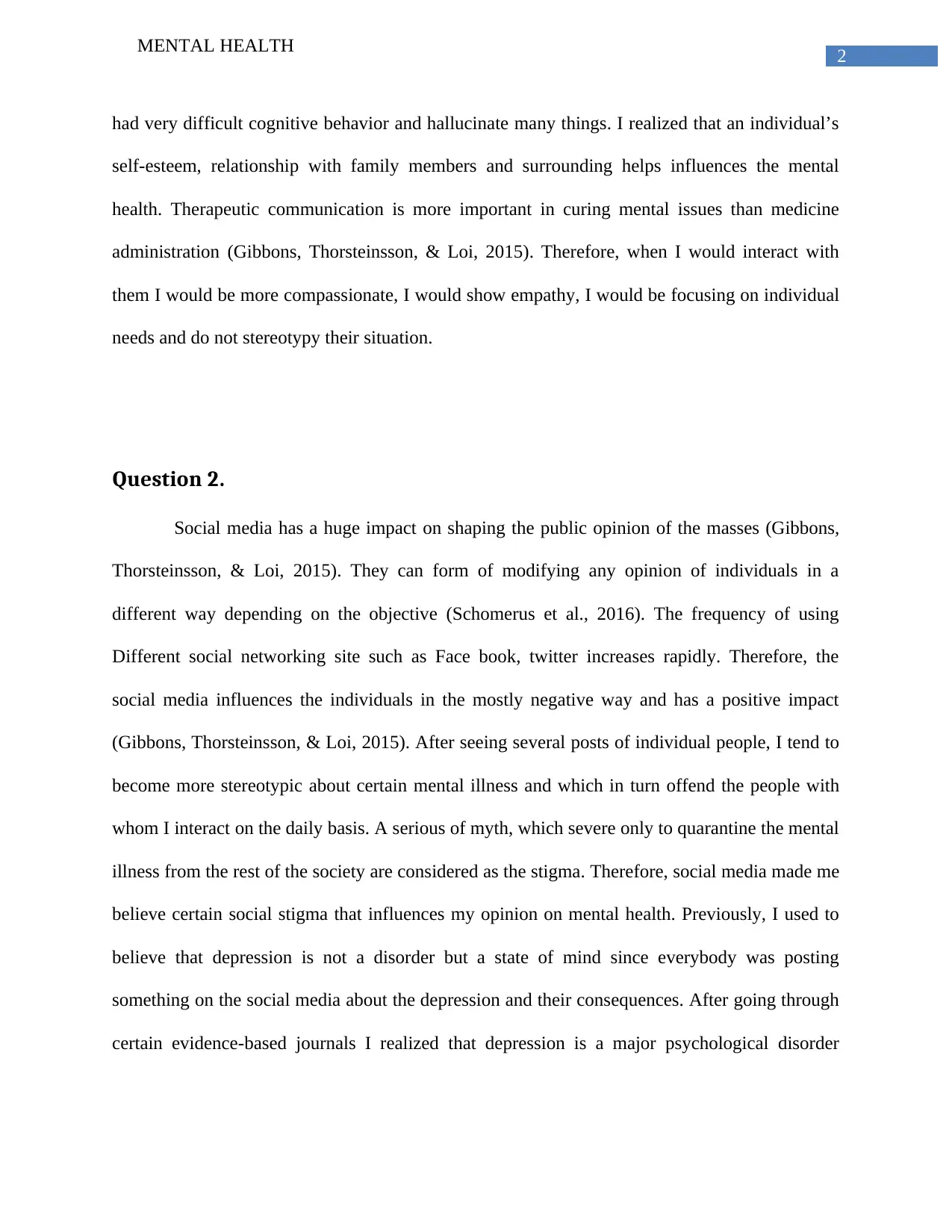
2
MENTAL HEALTH
had very difficult cognitive behavior and hallucinate many things. I realized that an individual’s
self-esteem, relationship with family members and surrounding helps influences the mental
health. Therapeutic communication is more important in curing mental issues than medicine
administration (Gibbons, Thorsteinsson, & Loi, 2015). Therefore, when I would interact with
them I would be more compassionate, I would show empathy, I would be focusing on individual
needs and do not stereotypy their situation.
Question 2.
Social media has a huge impact on shaping the public opinion of the masses (Gibbons,
Thorsteinsson, & Loi, 2015). They can form of modifying any opinion of individuals in a
different way depending on the objective (Schomerus et al., 2016). The frequency of using
Different social networking site such as Face book, twitter increases rapidly. Therefore, the
social media influences the individuals in the mostly negative way and has a positive impact
(Gibbons, Thorsteinsson, & Loi, 2015). After seeing several posts of individual people, I tend to
become more stereotypic about certain mental illness and which in turn offend the people with
whom I interact on the daily basis. A serious of myth, which severe only to quarantine the mental
illness from the rest of the society are considered as the stigma. Therefore, social media made me
believe certain social stigma that influences my opinion on mental health. Previously, I used to
believe that depression is not a disorder but a state of mind since everybody was posting
something on the social media about the depression and their consequences. After going through
certain evidence-based journals I realized that depression is a major psychological disorder
MENTAL HEALTH
had very difficult cognitive behavior and hallucinate many things. I realized that an individual’s
self-esteem, relationship with family members and surrounding helps influences the mental
health. Therapeutic communication is more important in curing mental issues than medicine
administration (Gibbons, Thorsteinsson, & Loi, 2015). Therefore, when I would interact with
them I would be more compassionate, I would show empathy, I would be focusing on individual
needs and do not stereotypy their situation.
Question 2.
Social media has a huge impact on shaping the public opinion of the masses (Gibbons,
Thorsteinsson, & Loi, 2015). They can form of modifying any opinion of individuals in a
different way depending on the objective (Schomerus et al., 2016). The frequency of using
Different social networking site such as Face book, twitter increases rapidly. Therefore, the
social media influences the individuals in the mostly negative way and has a positive impact
(Gibbons, Thorsteinsson, & Loi, 2015). After seeing several posts of individual people, I tend to
become more stereotypic about certain mental illness and which in turn offend the people with
whom I interact on the daily basis. A serious of myth, which severe only to quarantine the mental
illness from the rest of the society are considered as the stigma. Therefore, social media made me
believe certain social stigma that influences my opinion on mental health. Previously, I used to
believe that depression is not a disorder but a state of mind since everybody was posting
something on the social media about the depression and their consequences. After going through
certain evidence-based journals I realized that depression is a major psychological disorder
⊘ This is a preview!⊘
Do you want full access?
Subscribe today to unlock all pages.

Trusted by 1+ million students worldwide
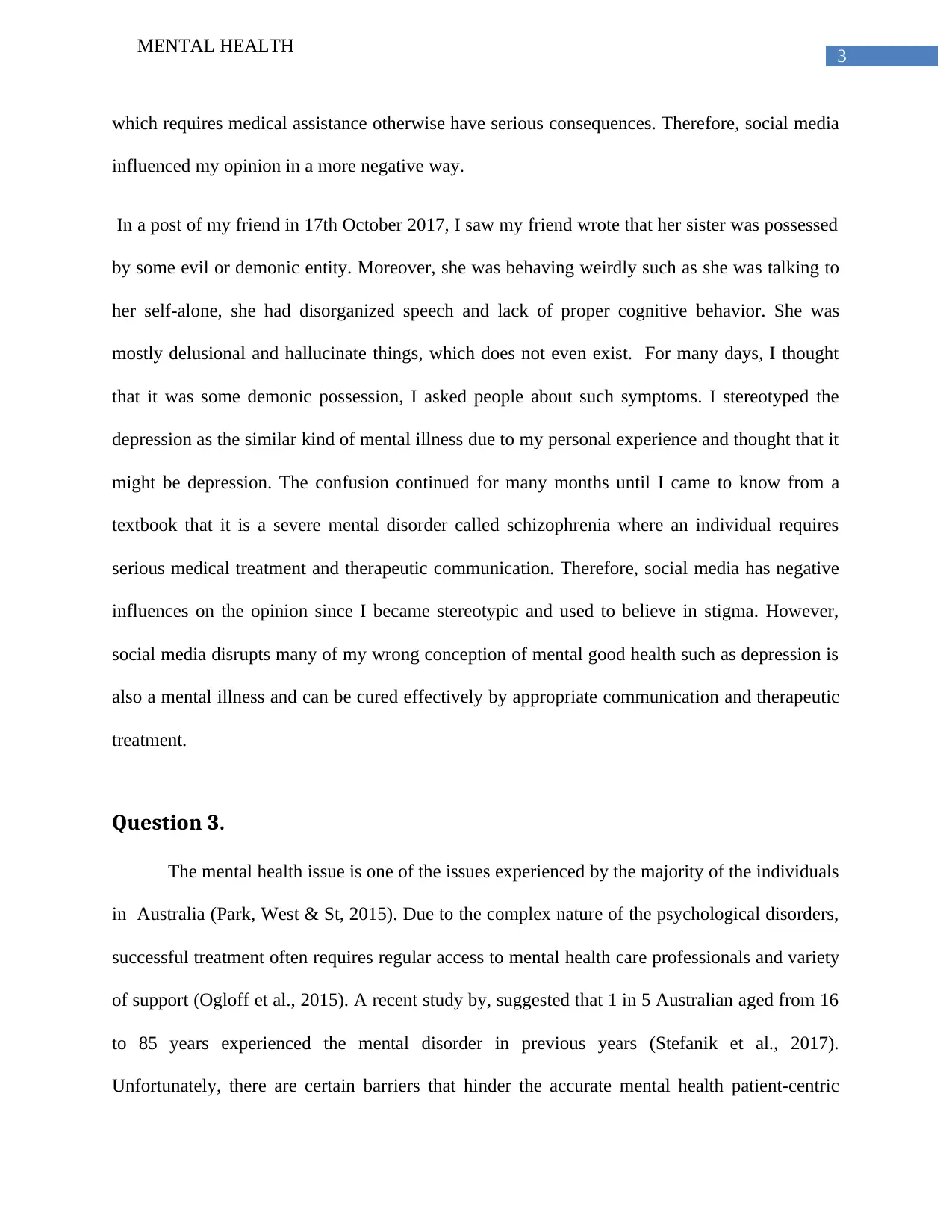
3
MENTAL HEALTH
which requires medical assistance otherwise have serious consequences. Therefore, social media
influenced my opinion in a more negative way.
In a post of my friend in 17th October 2017, I saw my friend wrote that her sister was possessed
by some evil or demonic entity. Moreover, she was behaving weirdly such as she was talking to
her self-alone, she had disorganized speech and lack of proper cognitive behavior. She was
mostly delusional and hallucinate things, which does not even exist. For many days, I thought
that it was some demonic possession, I asked people about such symptoms. I stereotyped the
depression as the similar kind of mental illness due to my personal experience and thought that it
might be depression. The confusion continued for many months until I came to know from a
textbook that it is a severe mental disorder called schizophrenia where an individual requires
serious medical treatment and therapeutic communication. Therefore, social media has negative
influences on the opinion since I became stereotypic and used to believe in stigma. However,
social media disrupts many of my wrong conception of mental good health such as depression is
also a mental illness and can be cured effectively by appropriate communication and therapeutic
treatment.
Question 3.
The mental health issue is one of the issues experienced by the majority of the individuals
in Australia (Park, West & St, 2015). Due to the complex nature of the psychological disorders,
successful treatment often requires regular access to mental health care professionals and variety
of support (Ogloff et al., 2015). A recent study by, suggested that 1 in 5 Australian aged from 16
to 85 years experienced the mental disorder in previous years (Stefanik et al., 2017).
Unfortunately, there are certain barriers that hinder the accurate mental health patient-centric
MENTAL HEALTH
which requires medical assistance otherwise have serious consequences. Therefore, social media
influenced my opinion in a more negative way.
In a post of my friend in 17th October 2017, I saw my friend wrote that her sister was possessed
by some evil or demonic entity. Moreover, she was behaving weirdly such as she was talking to
her self-alone, she had disorganized speech and lack of proper cognitive behavior. She was
mostly delusional and hallucinate things, which does not even exist. For many days, I thought
that it was some demonic possession, I asked people about such symptoms. I stereotyped the
depression as the similar kind of mental illness due to my personal experience and thought that it
might be depression. The confusion continued for many months until I came to know from a
textbook that it is a severe mental disorder called schizophrenia where an individual requires
serious medical treatment and therapeutic communication. Therefore, social media has negative
influences on the opinion since I became stereotypic and used to believe in stigma. However,
social media disrupts many of my wrong conception of mental good health such as depression is
also a mental illness and can be cured effectively by appropriate communication and therapeutic
treatment.
Question 3.
The mental health issue is one of the issues experienced by the majority of the individuals
in Australia (Park, West & St, 2015). Due to the complex nature of the psychological disorders,
successful treatment often requires regular access to mental health care professionals and variety
of support (Ogloff et al., 2015). A recent study by, suggested that 1 in 5 Australian aged from 16
to 85 years experienced the mental disorder in previous years (Stefanik et al., 2017).
Unfortunately, there are certain barriers that hinder the accurate mental health patient-centric
Paraphrase This Document
Need a fresh take? Get an instant paraphrase of this document with our AI Paraphraser
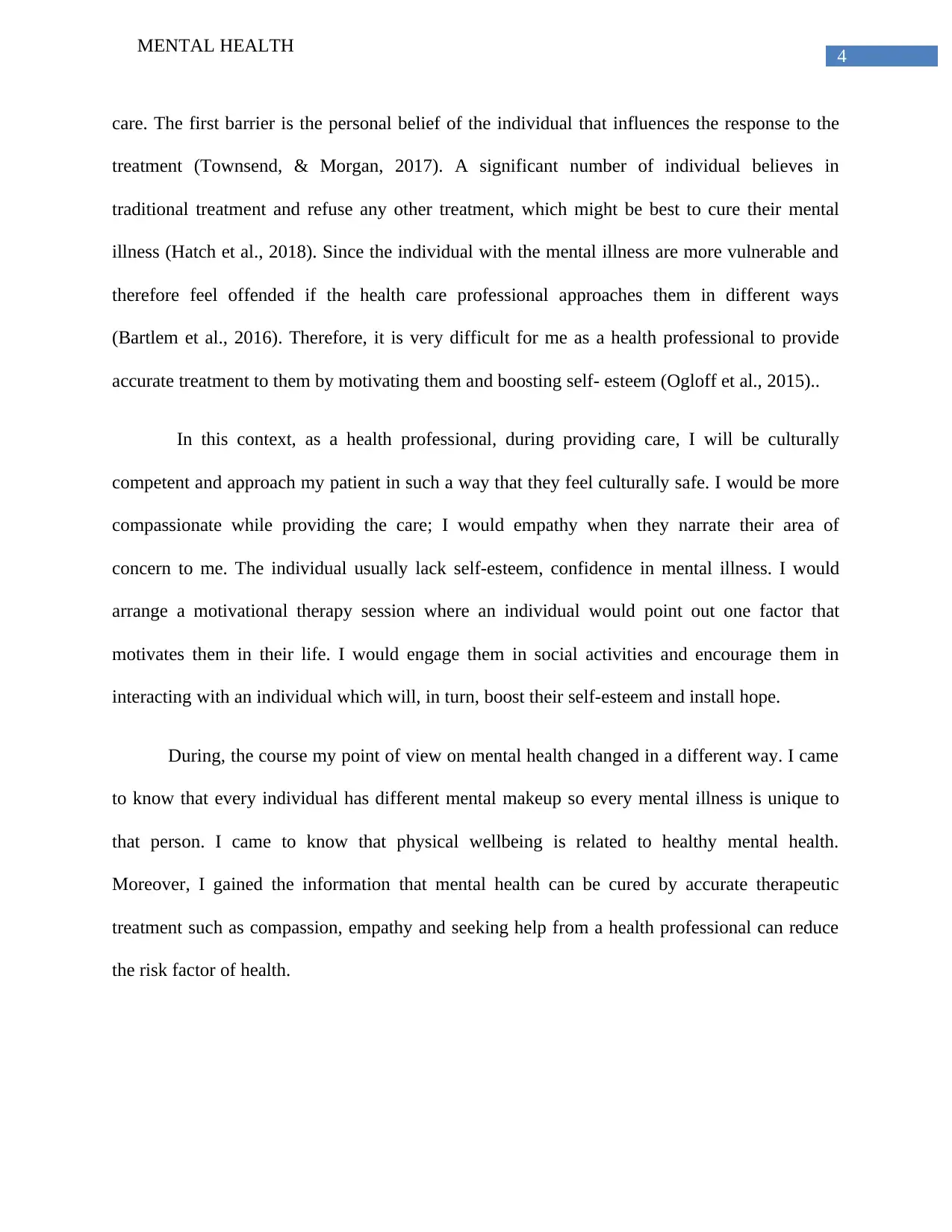
4
MENTAL HEALTH
care. The first barrier is the personal belief of the individual that influences the response to the
treatment (Townsend, & Morgan, 2017). A significant number of individual believes in
traditional treatment and refuse any other treatment, which might be best to cure their mental
illness (Hatch et al., 2018). Since the individual with the mental illness are more vulnerable and
therefore feel offended if the health care professional approaches them in different ways
(Bartlem et al., 2016). Therefore, it is very difficult for me as a health professional to provide
accurate treatment to them by motivating them and boosting self- esteem (Ogloff et al., 2015)..
In this context, as a health professional, during providing care, I will be culturally
competent and approach my patient in such a way that they feel culturally safe. I would be more
compassionate while providing the care; I would empathy when they narrate their area of
concern to me. The individual usually lack self-esteem, confidence in mental illness. I would
arrange a motivational therapy session where an individual would point out one factor that
motivates them in their life. I would engage them in social activities and encourage them in
interacting with an individual which will, in turn, boost their self-esteem and install hope.
During, the course my point of view on mental health changed in a different way. I came
to know that every individual has different mental makeup so every mental illness is unique to
that person. I came to know that physical wellbeing is related to healthy mental health.
Moreover, I gained the information that mental health can be cured by accurate therapeutic
treatment such as compassion, empathy and seeking help from a health professional can reduce
the risk factor of health.
MENTAL HEALTH
care. The first barrier is the personal belief of the individual that influences the response to the
treatment (Townsend, & Morgan, 2017). A significant number of individual believes in
traditional treatment and refuse any other treatment, which might be best to cure their mental
illness (Hatch et al., 2018). Since the individual with the mental illness are more vulnerable and
therefore feel offended if the health care professional approaches them in different ways
(Bartlem et al., 2016). Therefore, it is very difficult for me as a health professional to provide
accurate treatment to them by motivating them and boosting self- esteem (Ogloff et al., 2015)..
In this context, as a health professional, during providing care, I will be culturally
competent and approach my patient in such a way that they feel culturally safe. I would be more
compassionate while providing the care; I would empathy when they narrate their area of
concern to me. The individual usually lack self-esteem, confidence in mental illness. I would
arrange a motivational therapy session where an individual would point out one factor that
motivates them in their life. I would engage them in social activities and encourage them in
interacting with an individual which will, in turn, boost their self-esteem and install hope.
During, the course my point of view on mental health changed in a different way. I came
to know that every individual has different mental makeup so every mental illness is unique to
that person. I came to know that physical wellbeing is related to healthy mental health.
Moreover, I gained the information that mental health can be cured by accurate therapeutic
treatment such as compassion, empathy and seeking help from a health professional can reduce
the risk factor of health.
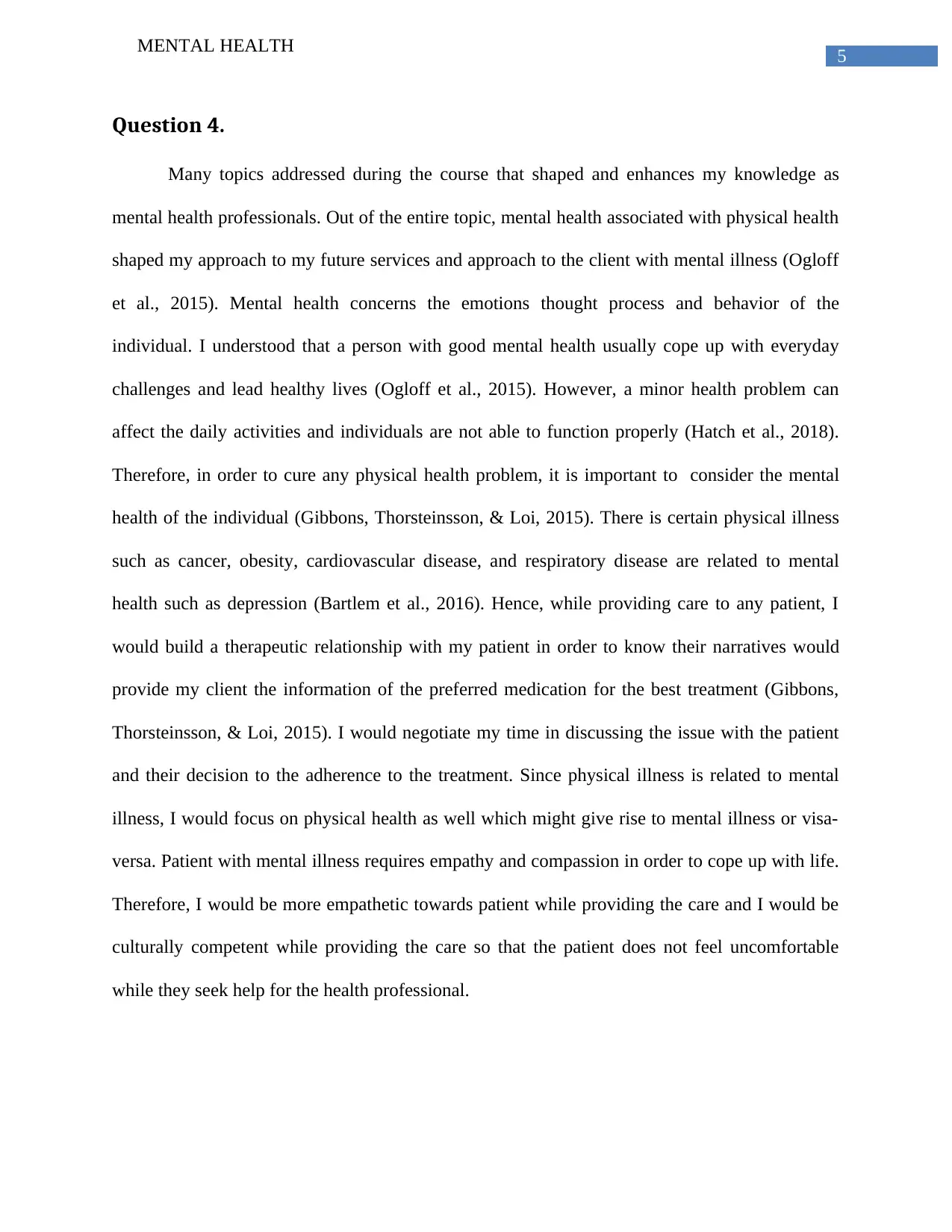
5
MENTAL HEALTH
Question 4.
Many topics addressed during the course that shaped and enhances my knowledge as
mental health professionals. Out of the entire topic, mental health associated with physical health
shaped my approach to my future services and approach to the client with mental illness (Ogloff
et al., 2015). Mental health concerns the emotions thought process and behavior of the
individual. I understood that a person with good mental health usually cope up with everyday
challenges and lead healthy lives (Ogloff et al., 2015). However, a minor health problem can
affect the daily activities and individuals are not able to function properly (Hatch et al., 2018).
Therefore, in order to cure any physical health problem, it is important to consider the mental
health of the individual (Gibbons, Thorsteinsson, & Loi, 2015). There is certain physical illness
such as cancer, obesity, cardiovascular disease, and respiratory disease are related to mental
health such as depression (Bartlem et al., 2016). Hence, while providing care to any patient, I
would build a therapeutic relationship with my patient in order to know their narratives would
provide my client the information of the preferred medication for the best treatment (Gibbons,
Thorsteinsson, & Loi, 2015). I would negotiate my time in discussing the issue with the patient
and their decision to the adherence to the treatment. Since physical illness is related to mental
illness, I would focus on physical health as well which might give rise to mental illness or visa-
versa. Patient with mental illness requires empathy and compassion in order to cope up with life.
Therefore, I would be more empathetic towards patient while providing the care and I would be
culturally competent while providing the care so that the patient does not feel uncomfortable
while they seek help for the health professional.
MENTAL HEALTH
Question 4.
Many topics addressed during the course that shaped and enhances my knowledge as
mental health professionals. Out of the entire topic, mental health associated with physical health
shaped my approach to my future services and approach to the client with mental illness (Ogloff
et al., 2015). Mental health concerns the emotions thought process and behavior of the
individual. I understood that a person with good mental health usually cope up with everyday
challenges and lead healthy lives (Ogloff et al., 2015). However, a minor health problem can
affect the daily activities and individuals are not able to function properly (Hatch et al., 2018).
Therefore, in order to cure any physical health problem, it is important to consider the mental
health of the individual (Gibbons, Thorsteinsson, & Loi, 2015). There is certain physical illness
such as cancer, obesity, cardiovascular disease, and respiratory disease are related to mental
health such as depression (Bartlem et al., 2016). Hence, while providing care to any patient, I
would build a therapeutic relationship with my patient in order to know their narratives would
provide my client the information of the preferred medication for the best treatment (Gibbons,
Thorsteinsson, & Loi, 2015). I would negotiate my time in discussing the issue with the patient
and their decision to the adherence to the treatment. Since physical illness is related to mental
illness, I would focus on physical health as well which might give rise to mental illness or visa-
versa. Patient with mental illness requires empathy and compassion in order to cope up with life.
Therefore, I would be more empathetic towards patient while providing the care and I would be
culturally competent while providing the care so that the patient does not feel uncomfortable
while they seek help for the health professional.
⊘ This is a preview!⊘
Do you want full access?
Subscribe today to unlock all pages.

Trusted by 1+ million students worldwide
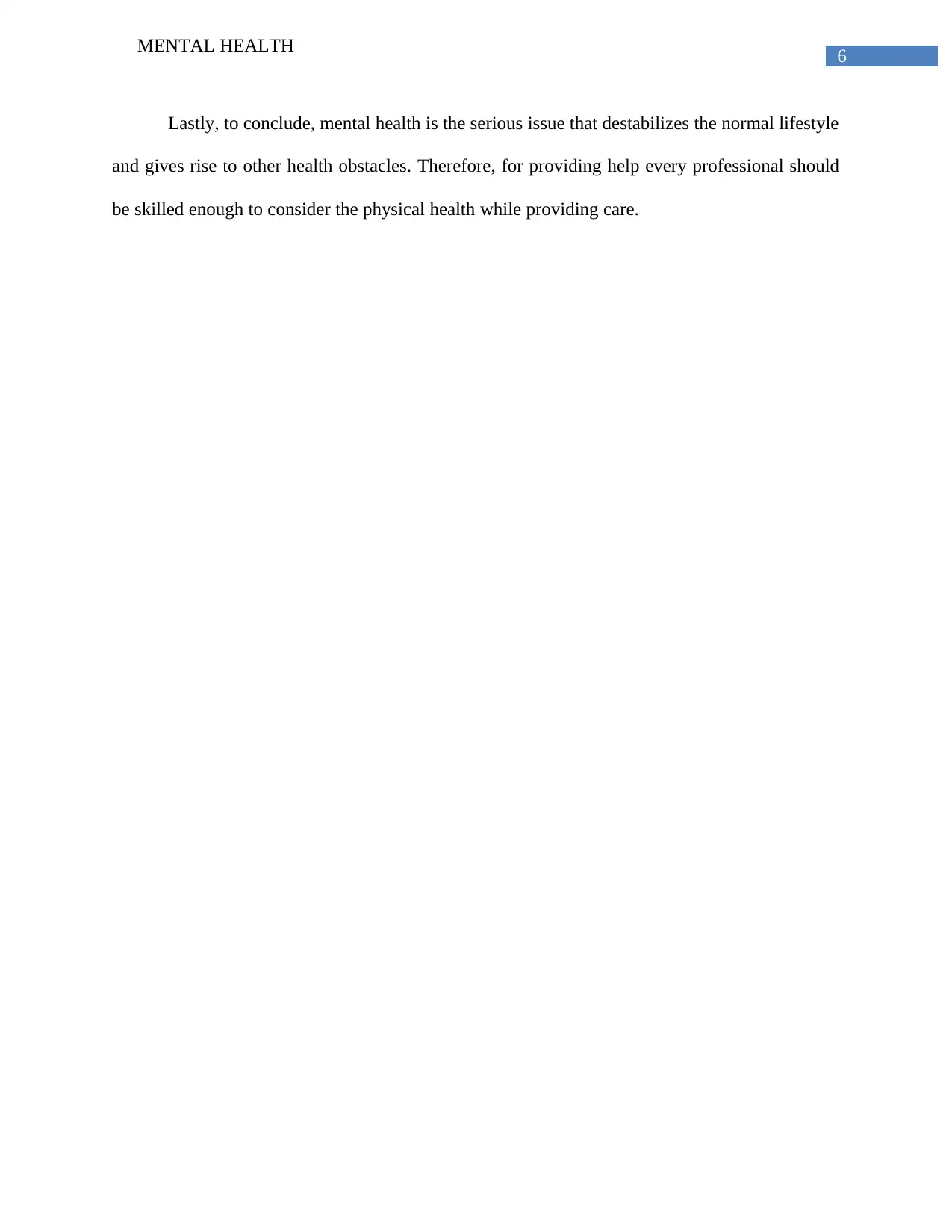
6
MENTAL HEALTH
Lastly, to conclude, mental health is the serious issue that destabilizes the normal lifestyle
and gives rise to other health obstacles. Therefore, for providing help every professional should
be skilled enough to consider the physical health while providing care.
MENTAL HEALTH
Lastly, to conclude, mental health is the serious issue that destabilizes the normal lifestyle
and gives rise to other health obstacles. Therefore, for providing help every professional should
be skilled enough to consider the physical health while providing care.
Paraphrase This Document
Need a fresh take? Get an instant paraphrase of this document with our AI Paraphraser
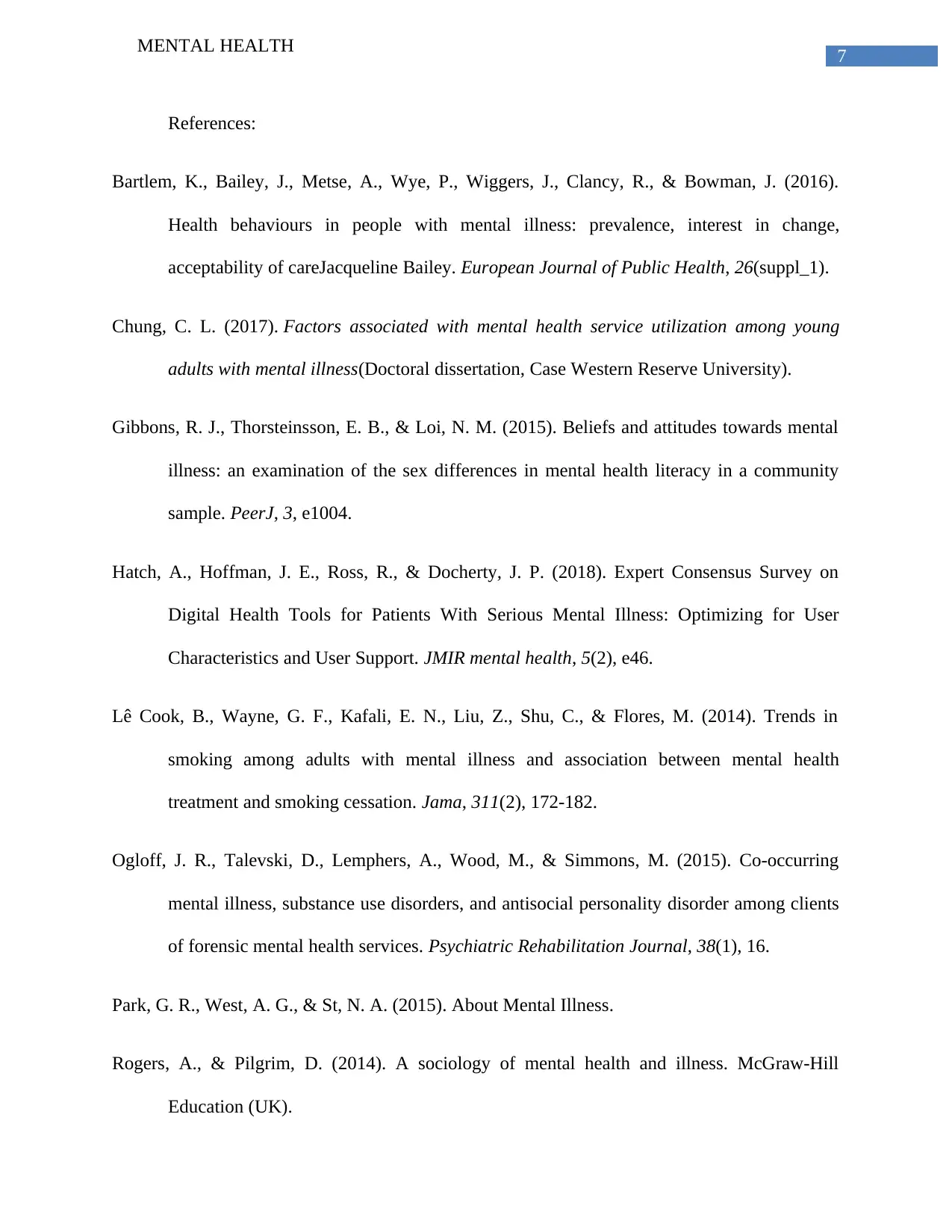
7
MENTAL HEALTH
References:
Bartlem, K., Bailey, J., Metse, A., Wye, P., Wiggers, J., Clancy, R., & Bowman, J. (2016).
Health behaviours in people with mental illness: prevalence, interest in change,
acceptability of careJacqueline Bailey. European Journal of Public Health, 26(suppl_1).
Chung, C. L. (2017). Factors associated with mental health service utilization among young
adults with mental illness(Doctoral dissertation, Case Western Reserve University).
Gibbons, R. J., Thorsteinsson, E. B., & Loi, N. M. (2015). Beliefs and attitudes towards mental
illness: an examination of the sex differences in mental health literacy in a community
sample. PeerJ, 3, e1004.
Hatch, A., Hoffman, J. E., Ross, R., & Docherty, J. P. (2018). Expert Consensus Survey on
Digital Health Tools for Patients With Serious Mental Illness: Optimizing for User
Characteristics and User Support. JMIR mental health, 5(2), e46.
Lê Cook, B., Wayne, G. F., Kafali, E. N., Liu, Z., Shu, C., & Flores, M. (2014). Trends in
smoking among adults with mental illness and association between mental health
treatment and smoking cessation. Jama, 311(2), 172-182.
Ogloff, J. R., Talevski, D., Lemphers, A., Wood, M., & Simmons, M. (2015). Co-occurring
mental illness, substance use disorders, and antisocial personality disorder among clients
of forensic mental health services. Psychiatric Rehabilitation Journal, 38(1), 16.
Park, G. R., West, A. G., & St, N. A. (2015). About Mental Illness.
Rogers, A., & Pilgrim, D. (2014). A sociology of mental health and illness. McGraw-Hill
Education (UK).
MENTAL HEALTH
References:
Bartlem, K., Bailey, J., Metse, A., Wye, P., Wiggers, J., Clancy, R., & Bowman, J. (2016).
Health behaviours in people with mental illness: prevalence, interest in change,
acceptability of careJacqueline Bailey. European Journal of Public Health, 26(suppl_1).
Chung, C. L. (2017). Factors associated with mental health service utilization among young
adults with mental illness(Doctoral dissertation, Case Western Reserve University).
Gibbons, R. J., Thorsteinsson, E. B., & Loi, N. M. (2015). Beliefs and attitudes towards mental
illness: an examination of the sex differences in mental health literacy in a community
sample. PeerJ, 3, e1004.
Hatch, A., Hoffman, J. E., Ross, R., & Docherty, J. P. (2018). Expert Consensus Survey on
Digital Health Tools for Patients With Serious Mental Illness: Optimizing for User
Characteristics and User Support. JMIR mental health, 5(2), e46.
Lê Cook, B., Wayne, G. F., Kafali, E. N., Liu, Z., Shu, C., & Flores, M. (2014). Trends in
smoking among adults with mental illness and association between mental health
treatment and smoking cessation. Jama, 311(2), 172-182.
Ogloff, J. R., Talevski, D., Lemphers, A., Wood, M., & Simmons, M. (2015). Co-occurring
mental illness, substance use disorders, and antisocial personality disorder among clients
of forensic mental health services. Psychiatric Rehabilitation Journal, 38(1), 16.
Park, G. R., West, A. G., & St, N. A. (2015). About Mental Illness.
Rogers, A., & Pilgrim, D. (2014). A sociology of mental health and illness. McGraw-Hill
Education (UK).
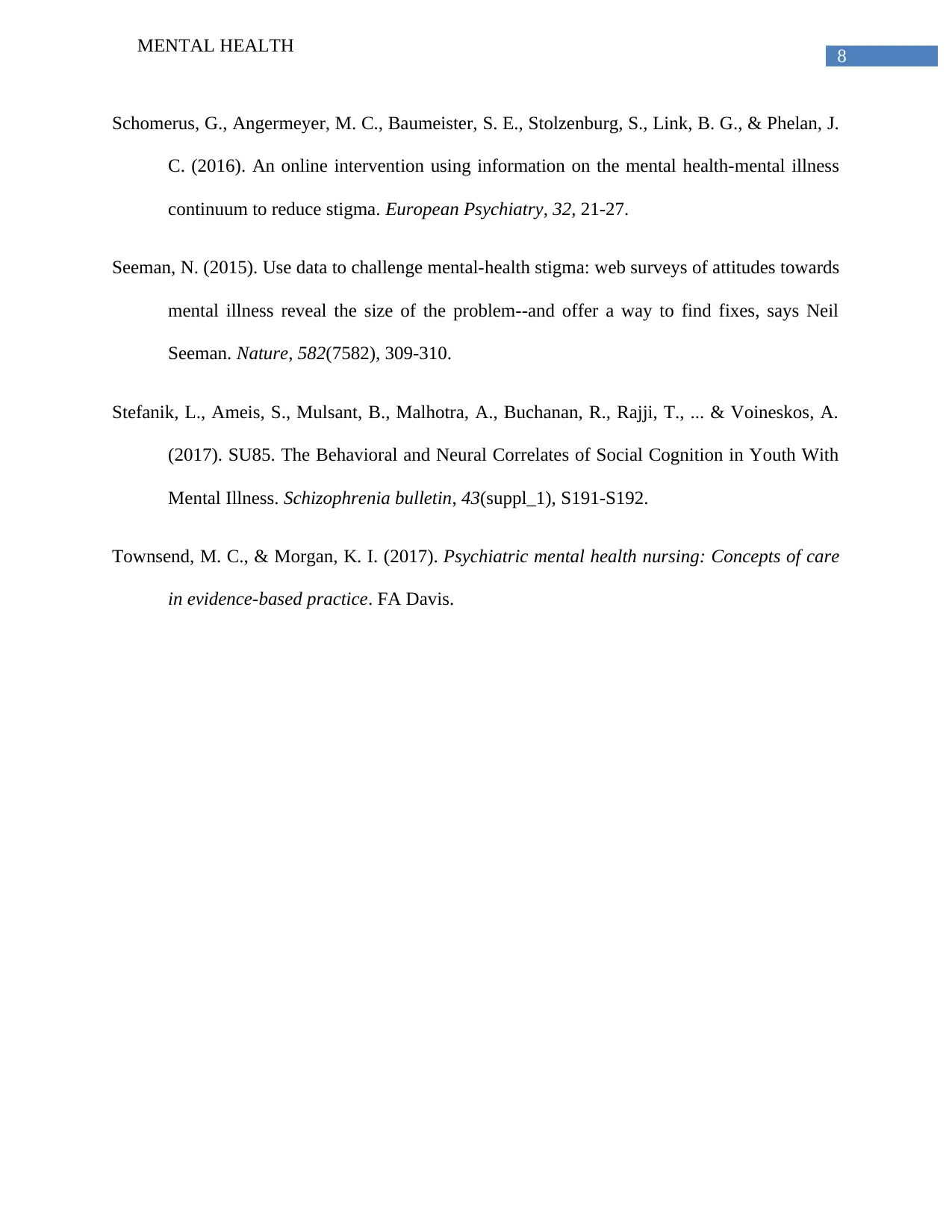
8
MENTAL HEALTH
Schomerus, G., Angermeyer, M. C., Baumeister, S. E., Stolzenburg, S., Link, B. G., & Phelan, J.
C. (2016). An online intervention using information on the mental health-mental illness
continuum to reduce stigma. European Psychiatry, 32, 21-27.
Seeman, N. (2015). Use data to challenge mental-health stigma: web surveys of attitudes towards
mental illness reveal the size of the problem--and offer a way to find fixes, says Neil
Seeman. Nature, 582(7582), 309-310.
Stefanik, L., Ameis, S., Mulsant, B., Malhotra, A., Buchanan, R., Rajji, T., ... & Voineskos, A.
(2017). SU85. The Behavioral and Neural Correlates of Social Cognition in Youth With
Mental Illness. Schizophrenia bulletin, 43(suppl_1), S191-S192.
Townsend, M. C., & Morgan, K. I. (2017). Psychiatric mental health nursing: Concepts of care
in evidence-based practice. FA Davis.
MENTAL HEALTH
Schomerus, G., Angermeyer, M. C., Baumeister, S. E., Stolzenburg, S., Link, B. G., & Phelan, J.
C. (2016). An online intervention using information on the mental health-mental illness
continuum to reduce stigma. European Psychiatry, 32, 21-27.
Seeman, N. (2015). Use data to challenge mental-health stigma: web surveys of attitudes towards
mental illness reveal the size of the problem--and offer a way to find fixes, says Neil
Seeman. Nature, 582(7582), 309-310.
Stefanik, L., Ameis, S., Mulsant, B., Malhotra, A., Buchanan, R., Rajji, T., ... & Voineskos, A.
(2017). SU85. The Behavioral and Neural Correlates of Social Cognition in Youth With
Mental Illness. Schizophrenia bulletin, 43(suppl_1), S191-S192.
Townsend, M. C., & Morgan, K. I. (2017). Psychiatric mental health nursing: Concepts of care
in evidence-based practice. FA Davis.
⊘ This is a preview!⊘
Do you want full access?
Subscribe today to unlock all pages.

Trusted by 1+ million students worldwide
1 out of 9
Related Documents
Your All-in-One AI-Powered Toolkit for Academic Success.
+13062052269
info@desklib.com
Available 24*7 on WhatsApp / Email
![[object Object]](/_next/static/media/star-bottom.7253800d.svg)
Unlock your academic potential
Copyright © 2020–2025 A2Z Services. All Rights Reserved. Developed and managed by ZUCOL.





